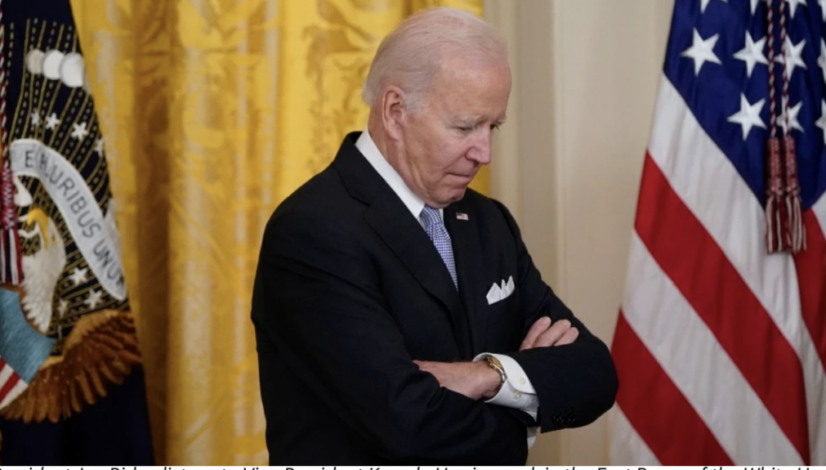The high cost of Biden’s bitter partisanship: Inaction

The nation is paying a price for President Biden’s divisive leadership.
At a moment of national outrage, with every American sickened by the horrific killing of 19 school children in Texas, our country looks to our president for answers. These terrible events must stop; sick, isolated hostile young men like the alleged shooter, Salvador Ramos, must not be allowed to buy guns. Their bizarre, threatening behavior must trigger responses that keep our communities safe. Our schools must be protected.
Biden has no answers. His default response to such tragedies is to lambast Republicans for protecting the gun lobby, doubling down on the divide he has widened in our country. And, worse, foregoing any chance of “working across the aisle,” as he famously promised to do when campaigning for the Oval Office.
The tragedy is that there is room for compromise on gun restrictions, but Biden has so poisoned relations between our nation’s two political parties that he has no chance of bringing Republicans and Democrats together. According to the Washington Post, he isn’t even trying.
In the wake of the recent Buffalo shootings, where 10 people were killed, some expected the president to try to restart negotiations on a long-shelved gun control bill sponsored by Sens. Joe Manchin (D-W.Va.) and Pat Toomey (R-Pa.). The bipartisan legislation, which was modest but at least broke a decade-long stalemate, had been crafted after the Sandy Hook school massacre of 20 children and 6 adults.
At that time, President Obama had tasked his vice president with creating a plan to combat mass shootings; in 2013, after scores of meetings and conversations, Biden revealed his roadmap, which included mostly meaningless initiatives such as requiring the Centers for Disease Control and Prevention to research the causes of gun violence and proposing a national conversation about mental health.
More promising was the independent Manchin-Toomey bill, created soon thereafter, which would have expanded background checks to most gun sales and which also offered some concessions to the National Rifle Association (NRA) in order to win Republican support. People close to the negotiations claim that Biden had little to do with creating the legislation or selling it to members of his own party.
The Washington Post quotes a former Democratic senate aide saying, “The Biden role was a joke. He couldn’t fight his way out of a paper bag. Biden did not move one single person.”
While the bill was not considered adequate to the challenge, advocates saw it as a promising first step. It failed in the Senate 54-46, with only four Republicans supporting the bill and four Democrats voting against it. One of those “no” votes came from Montana’s Max Baucus, a close friend of Biden; for political analysts, Baucus’s opposition summed up Biden’s lack of influence.
Here we are today, hoping that our president can bring the country, and Congress, together to pass common sense measures that might help stem the mass shootings that are a plague upon our nation. The obvious starting point would be reviving the Manchin-Toomey bill; some were expecting the White House to reach out to the senators who sponsored it.
No such luck. In a recent interview with the Washington Post, Toomey claimed that neither the president nor his staff had been in touch. The Republican senator was not surprised, telling the paper that “he has tried to engage the White House on other issues and has been unable to get Biden to take his calls.” One wonders what other opportunities for bipartisan action Biden has ignored.
Moments after issuing the requisite condolences to the grief-stricken parents of Uvalde, Biden launched into an angry tirade, demanding to know, “When in God’s name are we going to stand up to the gun lobby?”
He also used the solemn occasion to threaten his political opponents, saying “for those who obstruct or delay or block the commonsense gun laws, we need to let you know that we will not forget.”
After the terrible murders in Buffalo, Biden struck a similarly accusatory tone, railing about the evils of white supremacy and tying that vile philosophy to the demonstrations on Jan. 6. As if all the hate in the country nestled in the bosoms of Trump supporters.
There was a reason that Joe Biden campaigned on a promise to bring the country together. After years of bitterly divisive politics, Americans are exhausted by the rancor on both sides and aware that precious little can get done if the two sides cannot even speak to one another.
In his inaugural address, Biden pledged this: “Today, on this January day, my whole soul is in this: Bringing America together. Uniting our people. And uniting our nation.”
From that promising start, Biden has been as divisive and poisonous as his predecessor, if not more so. In a recent Economist/YouGov poll, asked whether on “political divide/polarization” the country was headed in the right or wrong direction, 75 percent of respondents (and 73 percent of Democrats) answered “wrong direction.” Only 9 percent thought we were moving in the right direction.
In March, a Monmouth University poll found 48 percent thinking that the country has become more divided under Biden, while 15 percent thought it had become more united.
These are bad report cards, but they are not surprising. For all his talk of toning down the divisive, angry rhetoric, Biden has proven to be an amplifier of hateful partisanship, blaming Republicans for every problem bedeviling our nation.
There is a cost to the divisiveness, as Biden himself has noted. At a campaign stop in 2020, Biden said, “If we can’t unite the country, we’re in trouble. America and our system runs on consensus.”
Now the president has been given a new challenge by a heartbroken nation: Protect our kids. Having alienated and insulted the very people he must bring on board to achieve any meaningful progress, Biden has lost that opportunity.
Published on The Hill




